- Home
- Mike Lupica
True Legend Page 2
True Legend Read online
Page 2
It was when he’d played that AAU all-star game, East versus West—back when he was still East, just thirteen years old—with a bunch of other guys from his New Heights team.
The game was on ESPN, first time on national TV for all of them. Huge deal.
People in New York, in high school ball and AAU ball, had started to notice Drew that year, his freshman year at Archbishop Molloy in Queens, playing for Jack Curran, a New York City basketball legend who’d been at Molloy long enough to win more games than any high school coach the city ever had.
Then came that all-star game and the two passes Drew made that ended up as SportsCenter’s number one and number two plays in their Top 10, ahead of everything else that happened in college and the pros that night.
Two passes he threw that were still getting hits on YouTube, even now.
And the funny thing was, there were at least four other passes in that game they could have gone with, if they’d wanted.
The first was one he’d been working on from the time his hands got big enough to control a regulation-size ball, one he knew he’d invented before other guys started showing up on YouTube with their own versions.
The one off his elbow.
What happened: Drew came down on the break, three on two, the defense backing up because they just knew something bad was about to happen to them, Drew on the fly, completely in charge of the action in front of him and all around him.
He had a Brooklyn kid from another AAU team, the Riverside Hawks, a stone-cold shooter named Ray Pope, in the right-hand corner, wide open, ahead of the play, all spotted up to make a three, waving for the ball.
Drew also had his own big dog from New Heights, DeMarcus Nelson, busting it from the left wing.
Drew knew the ball was supposed to go to the corner. Ray was on fire shooting the ball. He’d made his last three bombs in a row to break the game wide open.
And they’d left Ray wide open again.
Only Drew had a better idea.
He wanted to get the ball to DeMarcus as soon as he cleared traffic, let him throw one down, just because he’d earned the right, the way he’d been dominating the boards on both ends.
So what Drew did, he went behind his back with his left hand, like he was going to style the ball to Ray Pope that way.
Only as the ball came behind him, Drew pulled his right arm back just enough, used his right elbow to deflect the ball in the opposite direction. To DeMarcus. Whose dunk almost brought down the whole backboard, like he was trying to make ESPN’s Top 10 his own bad self.
That was Drew’s second-best pass of the night, at least according to SportsCenter.
Number one really was the one, the pass people still asked him about, just because they wanted to know how he saw everything he did and did everything he did on the last play of the first half.
It started simple enough. Drew was just trying to save the ball from going out of bounds, jumping in the air to save it in front of his own bench. Maybe in a real game he would’ve tried to call time-out from the air, because that was before they’d changed the rules. But it was an all-star game. It was on TV. Was supposed to be fun.
So why not have some?
As he got his hands on the ball, he was able to turn his body just enough to pick up the clock behind the basket, pick up where all the other players were at the same time.
Drew could always do that, from the time he was the smallest kid on Crotona Avenue, before he and his mom moved to Forest Hills. When John Calipari, the Kentucky coach, first saw him play in person, he told Drew, “Got an expression, kid. ‘The great coaches can see all ten.’ Meaning all ten players on the court at once. No matter where you think they’re looking. You? You always see the other nine, no matter where you are.”
What Drew saw in that moment, four seconds left in the half, was DeMarcus’s man in a switch, running to cover up on Corey Miles, another big kid on the East team, who was all alone on the right side of the basket, like Brandon was a dunk or layup waiting to happen.
It left DeMarcus open just enough on the other side.
But Drew had angled his body as much as he could. So the only way for him to make the pass to DeMarcus was to fire it off the shoulder of the defender who’d switched off him to chase Corey.
Like a bank shot in pool.
A kiss, like the announcers said, only not off the backboard—off somebody’s back instead.
The ball caught the kid just right, bounced straight into DeMarcus’s hands. Another dunk. Horn sounded. Halftime at Madison Square Garden, where the game was being played, the first time Drew had been there as anything except a fan.
Like they say: crowd went wild.
So did the announcers.
“I’ve heard of guys having to call backboard in H-O-R-S-E!” the play-by-play guy yelled. “But I never saw anybody bank one on purpose off the other team!”
His partner said it then.
“True that!”
The nickname stuck.
He was True Robinson after that. Just like that, the little kid from the Bronx was big. “Almost as big as your own head,” his mom liked to say.
Every time she did, she’d say it smiling, letting him know she was playing, the way he did with her, wanting him to know she didn’t really think his head had gotten too big for him.
Drew knew better. True knowing the real truth on that.
Darlene Robinson was watching him closer than anybody else was. Just not seeing the same things they were. She was always getting in her points—and digs—about the son she used to have and the star she was raising now.
It was why sometimes Drew had to get away from even her.
Her eyes.
Get himself his alone time.
• • •
His phone said it was one in the morning when he was ready to walk home. Before he left, he saw the patrol car pull up. That always happened at least once at this time of night.
The car usually came by more than once.
Tonight it was the two officers Drew knew best, Archey and Delano. Archey, who was behind the wheel, rolled down the window on his side, grinning at Drew as he stopped the car.
“There a reason we should know about why you’re perfecting your skills in the dark tonight?”
Delano was already out of the car, arms leaning on the roof. “You want to make sure you’ve got an edge if the lights ever go out in the gym?”
“Just sharpening my shooting eye,” Drew said.
“Gets any sharper,” Officer Archey said, “you’ll be able to slice up bread with it and make a sandwich.”
“No worries,” Drew said. “Done for the night.”
He tried to make one more over-the-shoulder shot, like the ghost guy had. Showing off for the cops.
Missed by a mile.
Drew retrieved his ball, walked toward the cop car. “Thanks for looking in on me,” he said. “Like always.”
Hearing his mom’s voice inside his head again—he’d never admit to her how much that happened, didn’t want to give her the satisfaction—the voice telling him to mind his manners with adults.
Officer Delano said, “We’re just looking to work security for you once you make the league.”
Drew smiled. The smile he used to save for the cameras, but was using more and more, trying to come across as nicer than he really was. “Oh, so that’s it?” he said. “Not doing your civic duty, just lookin’ for a piece of the boy?”
Officer Archey asked if Drew wanted a lift home.
Drew laughed. “Are you buggin’?” he said. “Next thing we all know, there’d be a picture of me on somebody’s cell, getting into the back of a police car.”
“But there’s nobody else around,” Archey said.
Drew said, “You sure?�
��
Delano said, “You see somebody?”
Maybe it was the way Drew had said it. Maybe cops were trained to hear things when nobody else did, even when you hadn’t said anything. But Delano stepped away from the car now, looked around.
Just doing his job.
“No, sir,” Drew said.
Not feeling like he was lying to the police—he still wasn’t positive that he had seen anything more than a ghost tonight at Morrison.
FOUR
The next day, he was going to take the bus over to Mr. Gilbert’s house in Thousand Oaks, just to hang before practice.
Mr. Gilbert said he never had to call first, just show up, bring friends if he wanted to, but they both knew that just meant the friend Drew needed to drive him there.
But Drew always called first, minding his manners the way his mom told him to. She never came out and said it, but she especially meant grown-ups who could help him.
Or maybe Drew just wanted to make sure Mr. Gilbert thought he was minding his manners. Even with people he liked, and he liked Mr. Gilbert, it was just part of being True Robinson. Putting moves on people out of force of habit.
So when he woke up he called and asked if he could come over later, watch a movie in the screening room or just play video games on the big screen in there, a kind of screen Drew had never seen outside a movie theater. You killed aliens on that sucker, you felt like you were in an action movie yourself.
“Mi casa es su casa,” Mr. Gilbert said on the phone.
“Gotta tell you about something weird I saw last night that sketched me out,” Drew said.
“Tell me when you get here,” Mr. Gilbert said. That meant he was on another call—Drew could always tell. “I’m in the middle of some deep commerce here.”
Meaning business. In Mr. Gilbert-speak.
Before he hung up, Mr. Gilbert said, “How you getting here? Lee bringing you?”
“He’s at the dentist’s today,” Drew said. “I was gonna take the bus.”
“Bus?” Seth Gilbert said. “My man True on a bus? I’ll have Eddie come get you.”
Eddie was Mr. Gilbert’s all-around guy, who lived in his gatehouse, drove him when he didn’t feel like driving, sometimes acted like a bodyguard.
“You don’t have to,” Drew said.
“I know,” Mr. Gilbert said.
Then he hung up.
Drew wasn’t clear how Seth Gilbert had made all his money. Just that he’d made the kind of money in his life that Drew hoped to make off playing ball eventually.
Seth Gilbert had made so much money that he and a couple of other rich-guy friends had put up the money to start Oakley Academy on about twenty acres of land in Westlake Village. The other guys, Drew had learned from Mr. Gilbert, wanted to build a high-end, college-prep-type school their kids could go to. Seth Gilbert was sending his son, Robbie, there, too, but he didn’t care as much about education, Robbie’s or anybody else’s, as much as this:
He wanted to build one of the best basketball programs in the state.
The gym at Oakley was even called the Henry Gilbert Athletic Center. It had been paid for by Mr. Gilbert alone and was named after his father.
As far as Drew could tell, Mr. Gilbert was obsessed with two things: making more money than he already had and basketball. He bragged all the time about the kids he’d sent to big colleges from some of the AAU teams he used to run. Only these days, he had nothing to do with AAU teams, just the players of Oakley Academy.
Mostly his focus was on one Oakley player: Drew.
“He says it’s about helping you get to where you need to go,” Darlene Robinson had said to Drew when they first moved to California. “The way I see it, it’s more about where he wants to go.”
“Here we go,” Drew said.
“I’m just sayin’,” she said.
“Mom,” Drew said, “he is your boss, right?”
“A good one, too. Best I ever had. But I’m not talking about the Mr. Gilbert of business. I’m talking about the basketball Mr. Gilbert.”
She did run his office for him, as his office manager, more like his assistant. Gilbert Consulting, it was called. She and Drew had first met him at the all-star game when Drew had made his TV passes, made a name—and a nickname—for himself just like that.
Mr. Gilbert had introduced himself in the locker room, and they had gotten to talking, and it was there that Darlene Robinson had mentioned that she was thinking about making what she called a “life change” for her and her son.
Before long, Seth Gilbert had taken charge of that change, offering her a better job and a better life in California, helping them move, even cosigning for a mortgage so they could have a nicer house in Agoura Hills than they would have been able to get on their own.
Just like that, they had a new life on the West Coast. They moved in the summer after Drew’s sophomore year at Molloy.
Darlene Robinson had what she wanted, and thought Drew needed, a basketball career away from the guys known as “street agents” in basketball, guys who worked for real agents and college coaches and even sneaker companies, trying to get their hooks into kids like Drew, future stars, as early as they could.
Drew knew there were street agents pretty much wherever there was a court and a game going on. But his mom had made up her mind—and once she did, you had about as much chance of changing it as of changing your Social Security number—that the worst street guys were in New York City, giving stuff to kids who had nothing, filling their heads with lies. They were nothing more than leeches and bloodsuckers, she kept telling Drew, with boxes of new sneakers in their arms and money that didn’t stay in their pockets very long because they were passing it around to kids who didn’t have any and whose eyes grew wide at the sight of easy money and free stuff.
Mr. Gilbert had made it all happen for them, as easy as if he’d snapped his fingers.
“Tell me again how all this helps him?” Drew said to his mom. “A hundred percent, he doesn’t need anything from me.”
Darlene Robinson said, “You think he’s joking when he says he wants to be your manager someday?”
“What if he did?” Drew said. “It wouldn’t be for my money. The man’s already got his.”
Darlene Robinson shook her head, smiling, like she was trying to be patient with a little boy. Sometimes she told Drew the only place where he could see clearly was on the basketball court. The rest of the time, he missed things that were right in front of his nose.
“You provide something more valuable to him than money,” she said.
“What’s that?”
“Access.”
“To who?”
“Whom?”
“Okay, whom?”
“To you,” she said. “What he wants more than anything is to be the man next to the man.”
“Me,” Drew said.
“Gives him a kind of power he could never have, no matter how much beach property he buys and sells from here to Malibu.”
“He’s already been real good to us, Mom.”
“I’m not saying he hasn’t,” she said. “I just want to make sure we always know why. Because it’s been my experience that nobody in this world ever does something for nothing.”
“Yes, ma’am,” he’d said at the time, because sometimes that was the only way to break free of a conversation like this, act all sweet and ma’am her, like he was breaking out of a double-team in the corner.
Now he was getting out of the Maserati Eddie had driven him over in, walking into Mr. Gilbert’s house, the idea of that word—house—always making him laugh, because this was a lot more than a house, it was more like Gilbert World.
The first time he brought Lee here, Lee had said, “Where’s the gift shop?”
That coming
from somebody whose family lived in this part of Thousand Oaks, too.
There was the big main house, what Mr. Gilbert had told Drew was built “hacienda style.” There was the gatehouse where Eddie lived. There was a pool house that would have been big enough for Drew and his mom to live in. And an Olympic-sized swimming pool. And a full basketball court, lighted. Mr. Gilbert had always told Drew that he could use the court anytime, day or night, whether anybody was home or not.
For some reason, Drew still preferred Morrison, maybe because it reminded him more of where he came from, not where he was going.
Mr. Gilbert was at the pool, finished with his morning swim, a BlackBerry on the table in front of him, along with a landline phone, a pot of coffee, and a big fruit plate. He had slicked-back gray hair, Pat Riley hair, still wet from the pool. He was wearing a Family Guy T-shirt.
Robbie Gilbert, his only child, was sitting across the table from him, eating scrambled eggs with one hand while he texted with the other, his iPhone almost on his plate.
Drew said, “Morning, Mr. G. Morning, Robbie.”
Robbie was frowning, like whatever text he was sending or receiving was some math problem he needed to solve.
Mr. Gilbert said, “Robbie, Drew said good morning.”
Robbie sighed, his fingers still on the iPhone. “Yo,” he said, not looking up.
Then his phone, on vibrate, made a buzzing sound and he had it in his hand with blinding speed.
His dad said, “You want to have a conversation with us or with . . . ?”
“I’m just setting up something for later with the guys in the band,” Robbie said. “You know I’m in a band, right? Even during basketball season?”
Drew poured himself some ice water, not wanting to be a part of this.
“You’re referring to the band I help finance?” his dad said.
“Here we go.”
It could start with the two of them, that fast, Drew knew from experience.
Just as fast, Robbie was up, cell phone in hand. “I’m out of here,” he said. He looked at his father, then Drew, and said, “I’m sure you two have a lot to talk about.”

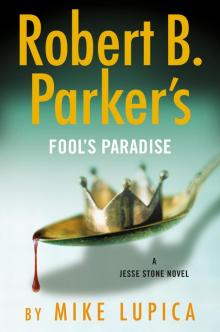 Fool's Paradise
Fool's Paradise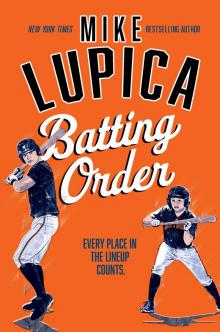 Batting Order
Batting Order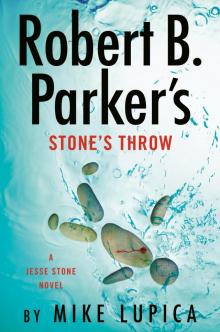 Stone's Throw
Stone's Throw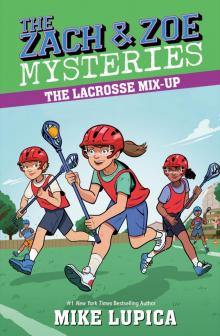 The Lacrosse Mix-Up
The Lacrosse Mix-Up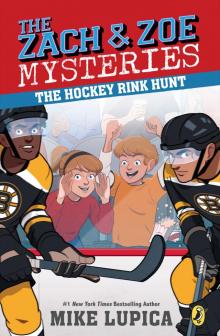 The Hockey Rink Hunt
The Hockey Rink Hunt Payback
Payback Triple Threat
Triple Threat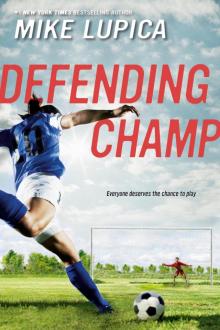 Defending Champ
Defending Champ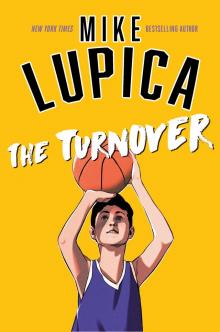 The Turnover
The Turnover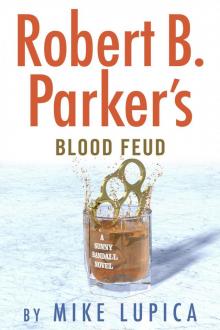 Robert B. Parker's Blood Feud
Robert B. Parker's Blood Feud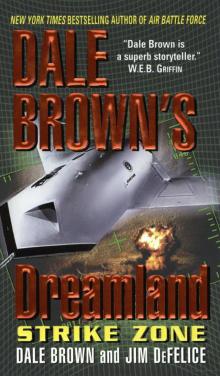 Strike Zone
Strike Zone Hero
Hero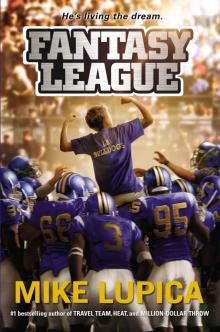 Fantasy League
Fantasy League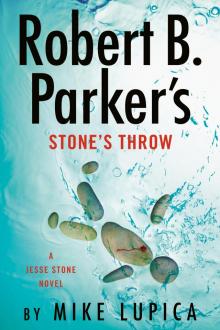 Robert B. Parker's Stone's Throw
Robert B. Parker's Stone's Throw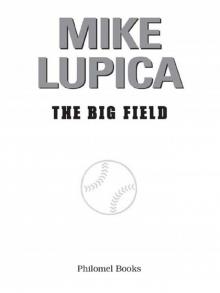 The Big Field
The Big Field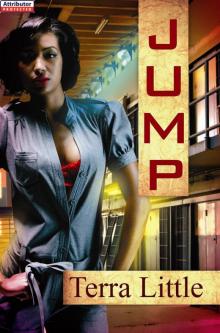 Jump
Jump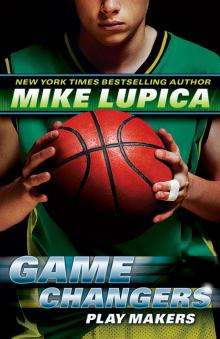 Play Makers
Play Makers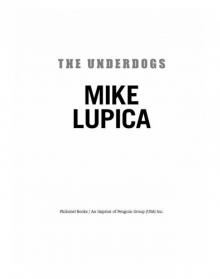 The Underdogs
The Underdogs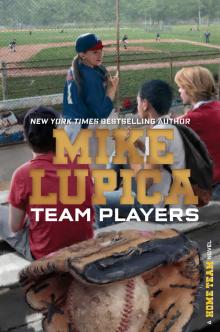 Team Players
Team Players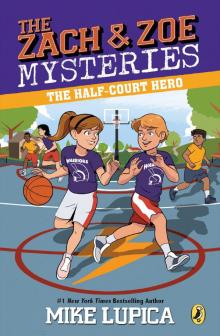 The Half-Court Hero
The Half-Court Hero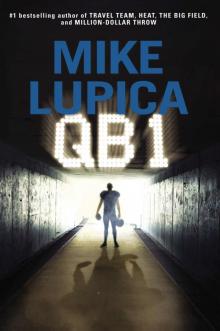 QB 1
QB 1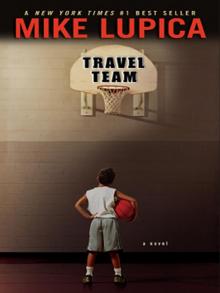 Travel Team
Travel Team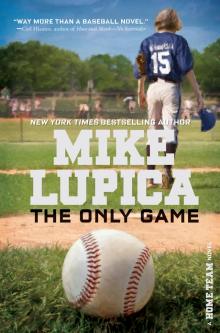 The Only Game
The Only Game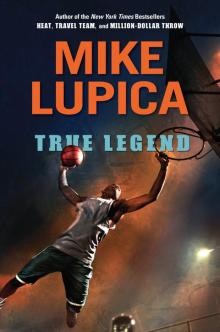 True Legend
True Legend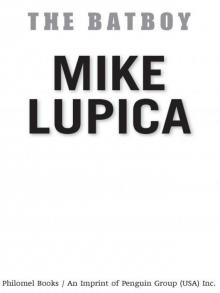 The Batboy
The Batboy Hot Hand
Hot Hand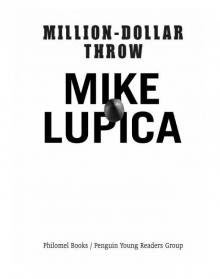 Million-Dollar Throw
Million-Dollar Throw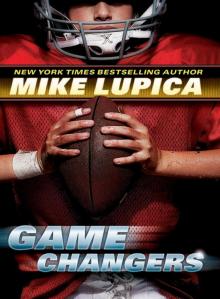 Game Changers
Game Changers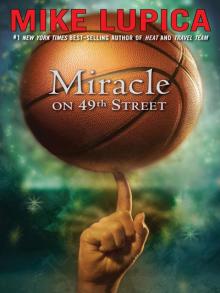 Miracle on 49th Street
Miracle on 49th Street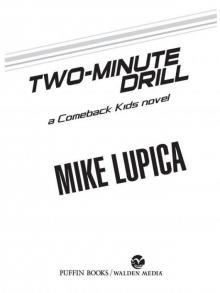 Two-Minute Drill
Two-Minute Drill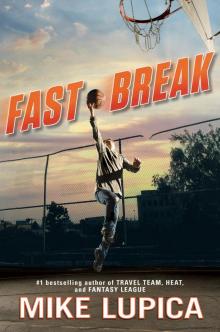 Fast Break
Fast Break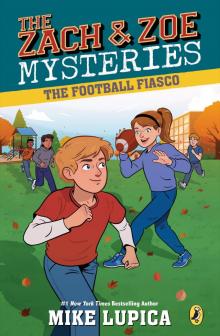 The Football Fiasco
The Football Fiasco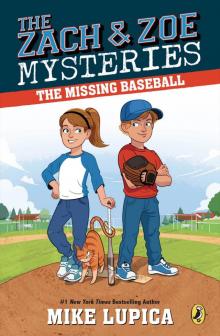 The Missing Baseball
The Missing Baseball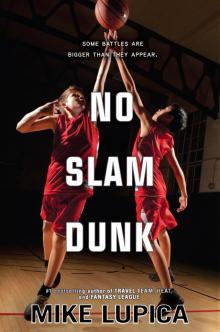 No Slam Dunk
No Slam Dunk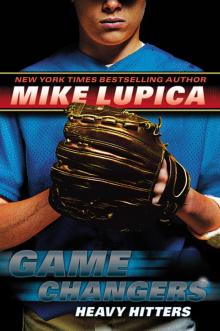 Heavy Hitters
Heavy Hitters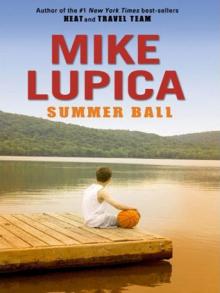 Summer Ball
Summer Ball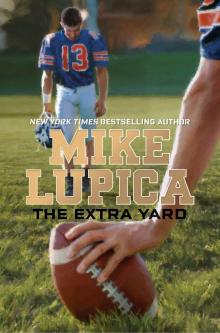 The Extra Yard
The Extra Yard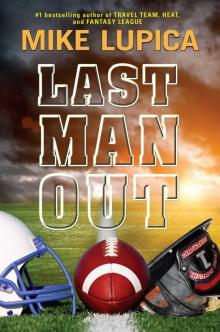 Last Man Out
Last Man Out